- Home
- Alison Booth
A Perfect Marriage Page 20
A Perfect Marriage Read online
Page 20
Helen doesn’t say anything right away. I wait, listening to her silence and the blood thumping in my ears.
‘What you tell me in this room is always confidential, Sally.’
I begin to talk. I tell her that since that terrible evening of Jeff’s fall I’ve sometimes wondered if I could have brought about a different outcome, that if I’d acted quickly enough I might have been able to stop him tumbling down the stairs. My words, compressed for years, escape like gas out of an uncorked flask and for a few seconds I imagine them floating in the air above the sofa, before dissipating slowly.
Afterwards, a feeling of acceptance, almost of peace, descends on me like a comforting blanket. I examine a yellow trapezium of sunlight that has appeared on the wall. Unnoticed by me while I have been talking, the morning has cleared. A chapter of my life is now closing.
I begin to feel detached, as if I am elevating to the ceiling. I look down to see Helen seated in her armchair, and there is my body, my carapace, lying supine on her sofa. I hover high above, floating and free.
‘That’s all we’ve got time for today, Sally.’ Helen breaks the spell. ‘Perhaps next time you will tell me how you and Jeff met. It might help you.’
‘How?’
‘Relating the beginning sometimes helps with coming to terms with the ending.’ She gets to her feet, and glides across the room, halting before she reaches the door. Her eyes on her new painting, she says, ‘Remember what you told me at the start of our session today. You said that when you chose Jeff you did the best you could with the information you had available at the time. You gained more information only subsequently. You couldn’t have known he’d be violent back before you married, and so you shouldn’t think you were a failure.’
These are the most sentences she’s ever spoken continuously to me. When she’s finished, like the perfect hostess she is she opens the door for me; she guides me out of her room.
‘Thank you, Helen,’ I say as I slip past.
‘It has been a pleasure,’ she says in her formal way. And then she shuts the door quietly behind me.
Chapter 44
THEN
The night I met Jeff, I was wearing a dark brown dress and carrying an embroidered purse with tiny mirrors sewn onto it. The first words Jeff ever spoke to me, before we even exchanged names, were: ‘Your dress is the same colour as your eyes.’ He stared intently at me, as if his words had more meaning than a simple observation. My friend Mary and I had just arrived at the party, and Jeff was the first person I noticed. I was struck by his height and elegance, and the thick fair hair that was so beautifully styled it might have been sculpted out of marble.
Embarrassed by his scrutiny, I looked down at my dress. This was the first time I had worn it. It was made of crushed velvet, with a low neckline and cut on the bias. Its hemline was rather uneven; my mother had shortened it for me only a few days before I left home to start university. I touched the fabric lightly before glancing at Jeff again. He was still staring at me. I tried to stop the blush that began in my neck and moved inexorably up to my face. My cheeks hot, I smiled at him before looking around for Mary, but she’d vanished.
‘You’re good when you’re smiling,’ he said, as if our acquaintance had been longer than sixty seconds in somebody’s shabby digs in a semi-detached house in Willesden Green.
‘Paying compliments is a very old-fashioned method of seduction,’ I said, continuing to smile.
‘Would you prefer me to lunge at you instead?’ he said, laughing. ‘Anyway, you’re much too young for me. Beautiful but young.’
‘I’ve just turned eighteen.’ Immediately I regretted telling him this. I should have said nearly nineteen. ‘And anyway, you’re much too old for me.’
‘I’m twenty-three. Suave and sophisticated although, alas, still a student.’
‘Not my type though,’ I said, although I didn’t mean it. He looked exactly my type.
‘Being rude is the modern form of seduction. Everyone’s doing rudeness now. In fact, rudeness is the new compliment. I read it in The Observer last Sunday.’
‘Self-defence in my case, not rudeness,’ I said, laughing.
‘So you need protection from me?’
‘No. I can look after myself.’
‘Well, do let me get you a drink, or would that be an act of aggression?’ He waited for an answer, as if his question was more than rhetorical.
‘No, that would be wonderful. Red wine please.’
‘Don’t go away,’ he said. ‘I like you.’
I had no intention of going away. I knew no one at the party apart from Mary and her brother, a final-year urban design student at the Bartlett School, who had invited us. And now this handsome stranger. Clutching my mirrored purse as if it were a talisman, I watched him manoeuvre his way through the crowd. He moved gracefully, like an athlete or a dancer. I saw him talk briefly to Mary, who was standing with her brother next to the drinks table. Soon he began to weave his way back. I looked away: I didn’t want him to see me observing him. I didn’t want to seem too interested.
‘You’re Sally,’ he said as he handed me a tumbler of red wine. ‘And I’m Jeff Hector, the well-known clairvoyant. I knew as soon as I clapped eyes on you that you were a Sally. A laughing Sally.’
‘A laughing jackass,’ I said. ‘You asked Mary my name just now. I might be a fresher but I’m not completely naïve.’
‘Delighted to hear it,’ he said, grinning. ‘That augurs well for Day One of our relationship.’
‘Night One,’ I said, and blushed when I realised too late how this might be interpreted.
Someone put on some music. It was an old and rather scratchy recording of The Eagles, One of These Nights. Jeff asked me to dance. In spite of the crowded room, he did not touch me. We danced as if there were an invisible barrier between us preventing us from moving closer, almost as if there were a physical force holding us apart.
But once the dancing had ended, we moved together and held each other. His hands and arms felt strong and comforting and we stayed like that for a long time. Then I pulled back to look at him. His eyes were glowing, his expression teasing, as he said, ‘I’ll let you go, just this once.’
Chapter 45
NOW
A few days after I told Helen about first meeting Jeff, a few days after she gave me a month’s notice, I dreamed of identifying his body as it lay on the gurney in that cold, cold mortuary. When I awoke, my pulses were racing and the stink of disinfectant mingled with ammonia was so strong in my nostrils that I could almost taste it. Some time later I fell asleep again, and dreamed of his warm body next to mine on our trip to La Spezia all those years ago. I drifted in and out of consciousness, and dreamed of him lying asleep next to little Charlie, a storybook open on the bed next to them. I awoke with a jerk, my pillow damp and an acid taste in my mouth. It took me a while to realise all that was more than ten years ago.
Now it is Friday evening. Charlie is out seeing a film with Amrita, and Zoë and I are alone in my living room. Zoë has been working in Amsterdam and it’s been weeks since I last saw her. She is lying stretched out on the sofa, and on the coffee table between us is the bottle of Sancerre that she brought with her. It is standing sentinel next to a plate of vegetables cut into strips and a couple of bowls of dips that I picked up on the way home from work.
‘How are things going with Helen?’ Zoë asks.
‘I told her about Jeff’s accident. I hadn’t been going to but I did.’
‘And what did she say?’
‘Nothing.’
‘Surely she said something, darling.’ Zoë sits up so abruptly that she sloshes a few drops of wine onto her blouse. This she ignores as she raises her eyebrows almost to her hairline. The scar that bisects her left eyebrow puckers a little. With her raised eyebrows, bright red lipstick, and heavily made-up face she looks like a caricature of a clown expressing astonishment.
‘Helen never says anything much. Sometimes she makes probi
ng little comments if things are going slowly but that’s about it.’
‘Comments like what?’
‘Like when she asked if I thought it was my fault Jeff hit me.’
‘She asked you that?’ Zoë raises her eyebrows again.
‘Yes.’
‘So if I saw her, she might ask if I thought it was my fault Jeff punched me because I scraped his bloody precious BMW.’ She takes a sip of wine as if it is medicine.
‘She was surprised I stayed with him.’ I walk to the window facing the back yard. Placing a hand on the pane of glass, I feel its coolness. A crisp half-moon illuminates the garden and casts deep shadows on the tiny lawn.
‘It’s not like Jeff’s life was insured,’ Zoë says. ‘Nothing material hinged on whether it was an accident or manslaughter.’
This is what it reduces to, I think as I watch the shadows flicker across the lawn and the last few autumn leaves drift to the ground. Nothing material hinged on the circumstances around Jeff’s death. ‘Helen has given me notice,’ I tell Zoë.
‘What, like an employee?’
‘Yes. She said I don’t need her any more. One month’s notice – that’s the deal.’ My life for months has been measured out in Tuesday mornings.
‘Good. What will you talk about for the next month then?’
‘Stream of consciousness stuff, I expect. I’ll see what comes up.’
‘Life’s too short to be endlessly contemplating your navel,’ Zoë observes.
‘Especially at eight o’clock in the morning.’
‘Did you tell Anthony about Jeff’s fall?’
‘Not the details. Too complicated. I told him everything except that though.’
‘You know, darling, Anthony’s probably glad you didn’t have a perfect bloody marriage. It means he won’t be competing with some ideal. He might actually prefer you human rather than perfect.’
‘Maybe.’ I keep my voice non-committal. A perfect bloody marriage. It was far from that. But I doubt if I’ll tell Anthony any more about it. At the moment I’m taking things with him a day at a time, and the days are good. Very good.
‘I wonder if Charlie’s been damaged by all this, Zoë. Knowing the way her father died. Knowing he was violent.’ I don’t need to add what lies unstated between us – that Charlie has learned that Zoë was her father’s lover. ‘Quite a shock.’
‘That’s an understatement, Sal. But she never idealised Jeff, so I think she’ll be OK. The odd thing is, she doesn’t blame me either. I thought she might...she might think I’d caused his death by taking him away from you.’
‘You’ve spoken about all this?’
‘On the phone last week. I called her up when I came home for a flying visit. She’d left a note in my flat for me.’
I suppose there’s a lot that Zoë and Charlie talk about that they never tell me. This thought makes me feel slightly left out. Suddenly I think of Charlie’s accusations about my boyfriends. I’d intended to raise this with Zoë at some stage, but now is not the time. Perhaps I never shall; perhaps it’s time that I stop trying to protect Charlie from the past.
Zoë adds, ‘Charlie left her note right next to the half-empty bottle of cognac. I’m glad she’s normal.’ She grins and I grin back. In a moment we are laughing, leaning over and clutching ourselves while we gasp for breath. Gusts of hilarity, convulsing paroxysms of mirth; I laugh while my stomach aches, we laugh until tears run down our faces.
When we have recovered I ask Zoë a question that has occurred to me a few times over the years. ‘Have you ever felt guilty about breaking up my marriage to Jeff?’
‘No. I did you a service.’
‘You’re amoral. I’ve always known that.’
‘So have I. It’s one of my many virtues.’
‘I’ve felt guilt, Zoë. Quite a lot over the years. Relief mainly, but guilt as well. I could have pushed Jeff less hard.’
‘For God’s sake, Sally, how could you possibly gauge exactly how hard to push the bastard? How could you possibly anticipate the haematoma? He’d punched you once already that evening and really hard too. He would have hit you again, you can bet on that. He was as angry as hell. It was you or him, don’t you see? It could have been you tumbling down the stairs, you landing on your head, you with a fractured spine or worse. And who would have looked after Charlie then? Not him, he couldn’t be trusted. You did right and you mustn’t ever think otherwise. I thought you’d got all of that out of your system years ago. And the bits you hadn’t got out of your system by now I thought the shrink was supposed to be extracting.’
‘Maybe I should tell Charlie that I might have been able to stop Jeff’s fall.’
‘For heaven’s sake, Sally. You’re the only person who’s ever thought that you could have done that. I was standing right next to you. There wasn’t a cat in hell’s chance you could have stopped him tumbling down those stairs. Charlie already knows that. It’s one of the things we spoke about.’
‘Did you? She didn’t tell me.’
‘She’s a sensitive young woman. And she felt bad that she’d worried you that night she was so late home. You couldn’t ask for a better daughter than Charlie. Full credit to you my friend.’
I swill down half my glass of wine and almost at once my body feels lighter, as if it might float away. My vision sharpens and I begin to see the room as if for the first time. Everything has meaning: Zoë’s face, as lovely as ever; the pieces of red and green pepper and sliced carrots on the plate; the pool of light reflecting on the polished timber floor; the framed photographs on the bookshelves.
‘Jeff wasn’t to know we’d become friends,’ Zoë says. ‘But we got the last laugh.’
‘He certainly can’t take that away from us.’
‘He can’t take anything away from us.’ She picks up the crudités platter and offers it to me. While crunching up a carrot stick, she says, ‘By the way, you do know that Charlie wants to visit Jeff’s grave, don’t you? What will you do?’
‘Take her of course.’ I glance at the Sancerre. There’s half a bottle left to drink in front of the movie we’re planning to download. ‘But I really don’t want to go.’
‘But you will, Sally.’ Zoë laughs, while leaning forward to touch my hand lightly. ‘You’re always the model mum,’ she says.
Chapter 46
NOW
A dense layer of clouds, relentlessly sombre, presses down on London. Today is 29 November. It is exactly eighteen years since I married Charlie’s father.
We join the M4 motorway and are caught up in a stream of traffic that is going too fast. Charlie, in charge of the music, plays compromise CDs that neither of us much likes. Beyond Reading, the clouds roll away and the landscape opens into the rolling green fields of Wiltshire, austerely beautiful. The trees, denuded of all leaves, reveal their structure: strongly buttressed trunks that taper to delicate lacework silhouetted against the pale sky.
The M4 gives way to the M5 and we exit in the Somerset Levels. At a supermarket we stop to buy flowers. I wait in the car while Charlie chooses them, a cellophane-wrapped bunch of white lilies. It is mid-afternoon by the time we reach the churchyard at Burnham-on-Sea. Charlie needs time alone at her father’s grave, she has said. After I find a parking place, she opens the passenger door. In her hand she holds the map I drew before leaving Kentish Town, the map of the churchyard that will show her where Jeff is buried. Her clenched jaw betrays her anxiety as she says, her words barely audible, ‘Can you meet me back here in one hour?’
I check my watch and she shuts the car door, too hard as usual. She strides along the gravel path leading to the far side of the churchyard, as if she is late for an appointment. My mobile phone pings, a text message from Anthony wanting to know if we’ve arrived safely. I tap out a reply promising to phone him later.
To fill in time I walk to the seafront. Opposite the promenade, a long row of Georgian and Victorian houses gaze vacantly seaward, over the concrete sea wall and the mud flats. T
he tide is out, and the expanse of mud stretches for perhaps half a mile towards the sea that is barely visible in the hazy late afternoon light; the palest blue-grey sky bleeding into grey-brown water.
When I first visited this town with Jeff, so many years ago, I hated the decaying splendour of its old houses and the modern additions made to hold the structures together. The double glazing, the stucco, the awnings providing shelter against the harsh weather, the pinball parlours. Even the once elegant old pier building was clad in the least attractive and cheapest materials that modern technology had to offer. But now I see the town in a new light. I admire its determination to fight the elements; to provide a Mediterranean-inspired seaside resort from the most unpromising raw materials; to pretend that here there is a beach and not an expanse of flat colourless mud.
The last time I was here was for Jeff’s funeral. Zoë and I arrived together. She caught the train down from London and I came up from Coverack; we’d arranged to meet up at the nearest station and share a minicab from there. Zoë, dressed in black as usual, and with the fading yellow bruise around her eye that she hadn’t concealed with make-up, was an embarrassment to Jeff’s family. No one could avoid looking at her injury but no one was going to comment on it. The mark on my cheekbone went unnoticed, covered with concealer I’d bought in Falmouth. Jeff’s father appeared old and grey and tired. He watched the proceedings gimlet-eyed, shattered by the loss of his son but unable to express his feelings. We shook hands after it was all over, but he didn’t look me in the eye. Afterwards Zoë and I caught a taxi to the station: she was in a hurry to get back to London, and I to Cornwall.
As I walk along the esplanade, a grey mist begins to roll in from the sea. The town becomes almost beautiful when there is no sun, in winter like this, when the harsh colours of the houses come into their own. The softening mist blurring things, like the passage of time.
By the time I return to the church, the light has almost gone. I cannot see Charlie anywhere. I walk straight to Jeff’s grave, on the far side of the graveyard. I look at the gilded curlicued lettering inscribed on the polished black granite headstone: ‘Jeff Hector, The Ideal Son,’ and underneath the dates of his birth and death. The Ideal Son. I had never understood this choice of words. Yet perhaps to Jeff’s parents he had been the ideal son: handsome, clever, creative. Jeff wouldn’t have liked the headstone his father chose. It could certainly not be described as minimalist. The black granite embellished at the top with an intricately carved branch of gilded roses.

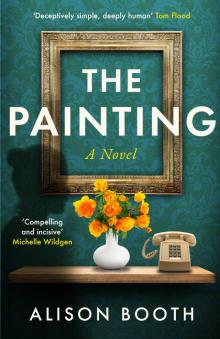 The Painting
The Painting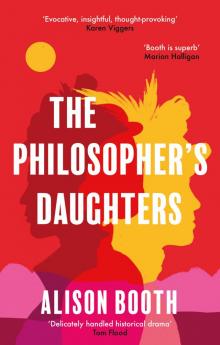 The Philosopher's Daughters
The Philosopher's Daughters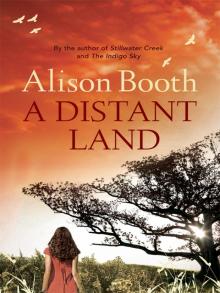 A Distant Land
A Distant Land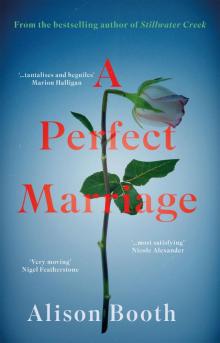 A Perfect Marriage
A Perfect Marriage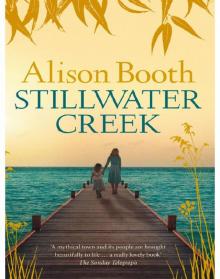 Stillwater Creek
Stillwater Creek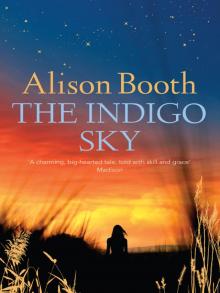 The Indigo Sky
The Indigo Sky